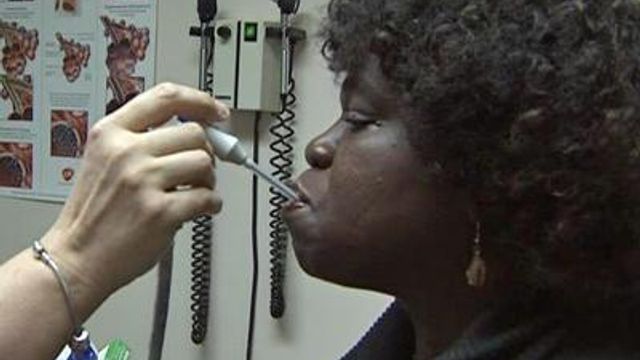Sore throat? You're not alone
Many people get sore throats this time of year. Over-the-counter medications may be the answer, but your throat could get worse without medical attention.
Posted — UpdatedA sore throat is one of the most common complaints of people coming to the doctor's office. Patients are often worried about strep infections, but only about one in every 10 patients has strep. Most are caused by viruses.
“My throat started bothering me, and I teach kindergarten and a lot of the children in the class have been having sore throats,” Marilyn Solomon told WRAL Health Team physician Dr. Allen Mask. “I'm in fear of getting strep because I've had it several times before.”
If your throat is sore, a doctor will examine you, looking for evidence of a fever, a red throat, possible white patches and tenderness in the lymph nodes of the neck.
“My last experience with it was my glands had swollen up like two eggs in my throat,” Solomon said.
Diagnosis is confirmed by a rapid strep test, which takes about five minutes. Sometimes the test can be inaccurate, so a traditional backup culture can be done, which takes about 24 to 72 hours.
“Were you surprised when I told you you didn't have strep throat?” Mask asked Solomon.
“Yes I was, because it seemed like all the symptoms were there and what the children had, theirs was strep,” she said.
“So how are you feeling now?” Mask asked.
“I'm feeling better,” Solomon said. “The soreness is not like it was before.”
Complications of untreated strep throat include rheumatic fever, which can affect the heart.
“The good news is if you do have strep throat, it's very easily treated with lots of different antibiotics,” Mask said. “(And) remember the basics, throat lozenges, lots of warm beverages and your mother was right, salt water gargles.”
Strep throat is highly contagious. It stops being contagious 24 hours after you've started antibiotic treatment. If left untreated, it can stay in your system and can infect other people for weeks after the symptoms vanish.
• Credits
Copyright 2024 by Capitol Broadcasting Company. All rights reserved. This material may not be published, broadcast, rewritten or redistributed.





